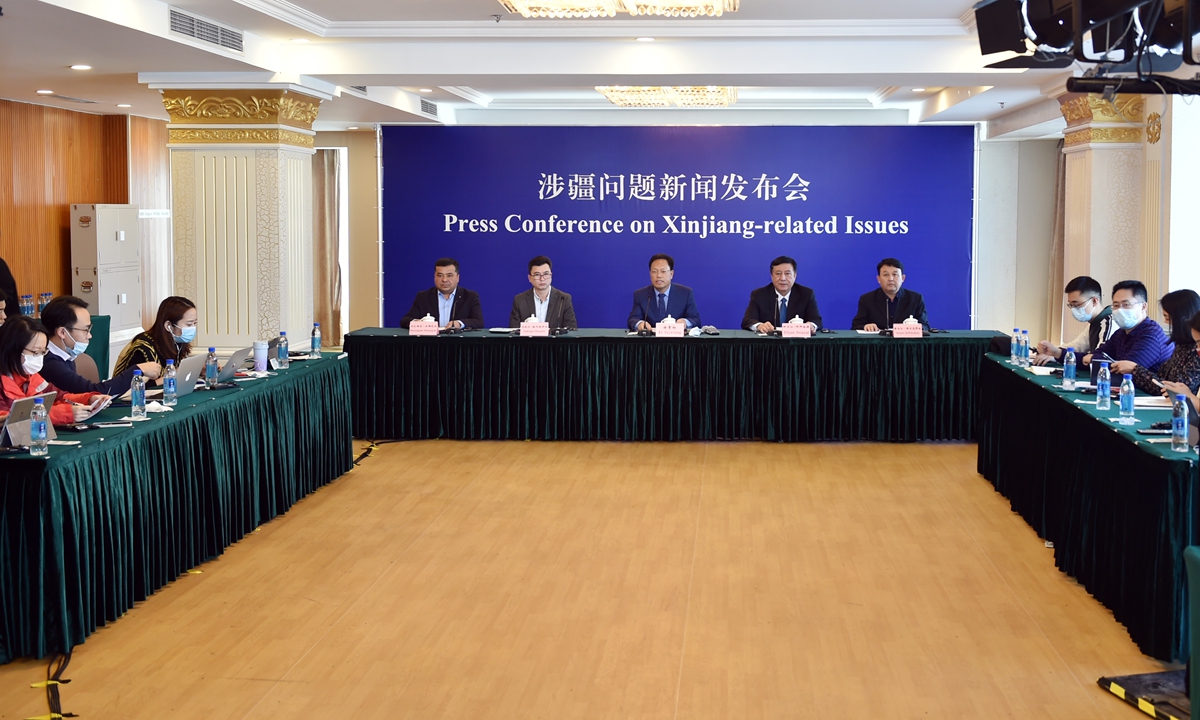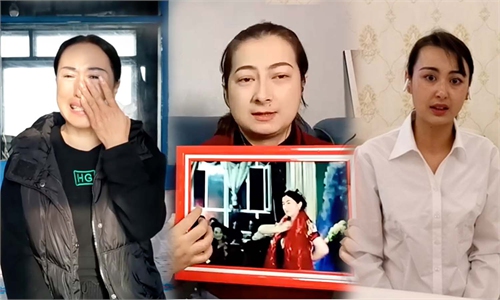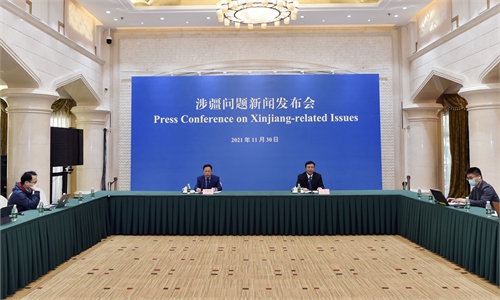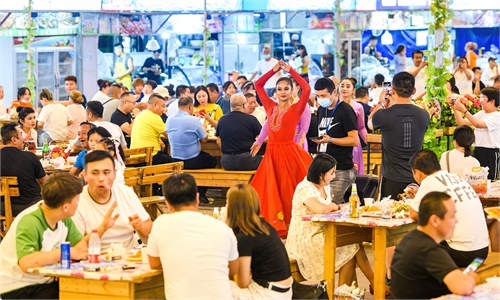Xinjiang regional government introduces democracy practices, lashes out at US democratic hegemony

Photo: Global Times
As the only region that has set up three-level autonomous administrations in China, Northwest China's Xinjiang Uygur Autonomous Region has fully implemented regional ethnic autonomy and practiced whole-process democracy, which ensures the status of masters of all the ethnic groups in the region and promotes regional development, said a regional spokesperson on Monday, while lashing out at the US for smearing the region's democracy and human rights, and brazenly exporting its own flawed democracy.
"Recently, topics on democracy have attracted international attention, especially after the US announced plans to hold a "democracy summit" on December 9 and 10, which has come under criticism by the international community," Xu Guixiang told a press conference in Beijing.
People attending the press conference include members of the ethnic, religious, foreign affairs and overseas Chinese committee of the Standing Committee of the Xinjiang People's Congress, legislative affairs committee of the Standing Committee of the Xinjiang People's Congress, and a director of the village committee in an autonomous county in Xinjiang who provide details and examples about how whole-process democracy has been practiced in the region.
In Xinjiang, all ethnic groups enjoy equal voting rights, and they directly vote for candidates of the county-and-township-level people's congresses. Members of the prefecture-and-city-level members and members of the National People's Congress are elected. Among the 61 members of the 13th National People's Congress in Xinjiang, 38 are from ethnic groups, accounting for 62.3 percent of the total members, said Nabijan Ibrayim, a member of the Legislative Affairs Committee of the Standing Committee of Xinjiang People's Congress.
There are a total of 2,488 members of the prefecture-city-level People's Congress in Xinjiang, and 1,349 are from ethnic groups, accounting for 54.22 percent of all the members. Among the 43,204 members of the county-township-level People's Congress, 31,739 are from ethnic groups, Nabijan said.
To give a better and clearer introduction of how the grassroots democratic election system works in Xinjiang, Su Delin, a 50-year-old resident of the Hui ethnic group, shared how he was elected as the director of the village committee of Miliangquan village, Chapchal Xibe autonomous county this year.
During the election, villagers held a meeting and elected the village election committee by secret ballot. To ensure the villagers' rights to information, the election committee promoted related laws, regulations and procedures via loudspeakers in the villages, as well as through WeChat groups, bulletin boards and pamphlets. The village also set up hotlines for villagers' inquiries, Su said.
On the election day, all candidates met with the villagers, introduced their plans, and answered questions from villagers. After the vote, working staff checked and counted the ballots and announced the results at the site, Su said. "The turnout rate in our village reached 99.8 percent and females accounted for 60 percent of the newly elected village committee."
On Saturday, China released a white paper on its democracy, with the system of regional ethnic autonomy being an important part of China's whole-process democracy.
The Chinese people are best qualified to appraise the regional ethnic autonomy system and whether it works well. Tremendous progress in ethnic areas has been made, and statistics showing that all ethnic groups are living a good life are the best answers, Xu Yousheng, a vice minister of the United Front Work Department of the Central Committee of the Communist Party of China, told a press conference at the release of the white paper on Saturday.
The practice of democracy in Xinjiang vividly displays socialist democracy with Chinese characteristics, and it has ensured the prosperity and unification of the region.
"However, the anti-China forces in the US have blatantly smeared the democracy building in Xinjiang, turned blind eyes to the democracy and rights local residents have enjoyed, and interfered with our internal affairs," Xu Guixiang said.
The spokesperson noted that the US has presented itself as a "democracy beacon" or "model for democracy," but judging from reality, "US-style democracy is actually the privilege of a small group of people, the servant of US money politics, and an excuse for US politicians to canvass votes and cover up for interference in other countries' internal affairs," Xu Guixiang said.
What has astonished the world is that such a pseudo-democratic and anti-democratic country is organizing a summit on "democracy," which is totally a malicious move to incite ideological confrontation, promote hegemony and a cold war mentality, and go against the global forward trend, said the spokesperson.
Elijan Anayat, another spokesperson of the Xinjiang regional government, explained how the US political system has been corrupted by money, with ordinary people's political rights being deprived.
Elections in the US have become games of money. The high costs have excluded the majority of people from participating in the election campaign. Money politics in the US means its policies fully served the rich for the past 40 years, and the government has become the voice of interest groups, Elijan said, noting that where there is money politics, there is no real democracy.
US-style democracy is not real democracy, since ethnic races do not have their rights to democracy and human rights, said officials from the Xinjiang regional government, citing data from the US media and US authorities saying that the unemployment rates for African-Americans and Latin-Americans are higher than those of white people.
Aside from its domestic plight, US moves to export democracy to impose its system and values on other countries have increased tensions and clashes, leading to numerous humanitarian crises, Serjan Sidikbay, a deputy secretary general of the 12th CPPCC Committee of Xinjiang Uygur Autonomous Region, said at the press conference.
For example, under the banner of countering terrorism and with the aim of planting US democracy in Afghanistan, the US invaded Afghanistan in 2001, and 20 years later, it left a war-torn country. Moreover, in 2010, the US incited the "Arab Spring," leaving more than 10 countries to fall into regime change and economic decline, said Serjan.
"We must point out that each country's road to democracy should fit its own environment and should be explored by its own people. Using one model to evaluate all countries is not democracy, and it goes against the core of democracy. Such democratic hegemony would be resisted and opposed by the international community," said Serjan.




